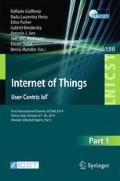Abstract
In this paper we present the evaluation process for Barbarossa, a pervasive role playing game. Barbarossa involves an invitational (preparatory) and a main execution phase. The former is freely available though Google Play store and may be played anytime/anywhere. The latter defines three inter-dependent player roles acted by players who need to collaborate in a treasure hunting game. The eligibility of players for participating in the main game phase is restricted among those ranked relatively high in the invitational phase. Herein, we investigate the impact of the invitational game mode on the players overall game experience. The main hypothesis tested is that game awareness (gained from participating in a preliminary game phase) may serve as a means for recruiting the most suitable subjects for user trials on pervasive game research prototypes.
Access this chapter
Tax calculation will be finalised at checkout
Purchases are for personal use only
References
Jegers, K.: Pervasive GameFlow: Identifying and Exploring the Mechanisms of Player Enjoyment in Pervasive Games. Department of informatics, Umeå university, Umea(2009)
Saarenpää, H.: Data Gathering Methods for Evaluating Playability of Pervasive Mobile Games (2008)
Montola, M., Stenros, J., Wærn, A.: Pervasive Games: Theory and Design. Morgan Kaufmann Publishers, Burlington (2009)
Fischer, J., Lindt, I., Stenros, J.: Final crossmedia report (Part II) – Epidemic Menace II evaluation report (2006)
Guo, B., Fujimura, R., Zhang, D., Imai, M.: Design-in-play: improving the variability of indoor pervasive games. Multimedia Tools Appl. 59, 259–277 (2012)
Kirman, B., Linehan, C., Lawson, S.: Blowtooth: a provocative pervasive game for smuggling virtual drugs through real airport security. Pers. Ubiquit. Comput. 16, 755–767 (2012)
Benford, S., Flintham, M., Drozd, A., Anastasi, R., Rowland, D., Tandavanitj, N., Adams, M., Row-Farr, J., Oldroyd, A., Sutton, J.: Uncle Roy all around you: implicating the city in a location-based performance. In: Proceedings of Advanced Computer Entertainment, ACM (2004)
Hannamari, S., Kuittinen, J., Montola, Μ.: Insectopia evaluation report (2007)
Jones, M., Marsden, G.: Mobile Interaction Design. Wiley, Chichester (2006)
Kasapakis, V., Gavalas, D., Bubaris, N.: Addressing openness and portability in outdoor pervasive role-playing games. In: Third International Conference on Communications and Information Technology (ICCIT), pp. 93–97 (2013)
Author information
Authors and Affiliations
Corresponding author
Editor information
Editors and Affiliations
Rights and permissions
Copyright information
© 2015 Institute for Computer Sciences, Social Informatics and Telecommunications Engineering
About this paper
Cite this paper
Kasapakis, V., Gavalas, D., Chatzidimitris, T. (2015). Evaluation of Pervasive Games: Recruitment of Qualified Participants Through Preparatory Game Phases. In: Giaffreda, R., et al. Internet of Things. User-Centric IoT. IoT360 2014. Lecture Notes of the Institute for Computer Sciences, Social Informatics and Telecommunications Engineering, vol 150. Springer, Cham. https://doi.org/10.1007/978-3-319-19656-5_18
Download citation
DOI: https://doi.org/10.1007/978-3-319-19656-5_18
Published:
Publisher Name: Springer, Cham
Print ISBN: 978-3-319-19655-8
Online ISBN: 978-3-319-19656-5
eBook Packages: Computer ScienceComputer Science (R0)

